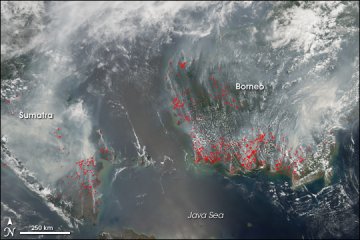Borneo and Sumatra burn as forest fires rage
Borneo and Sumatra burn as forest fires rage
mongabay.com
October 4, 2006
Forest fires are again burning across Borneo and Sumatra according to satellite images released this week by NASA.
The fires, set on a seasonal basis for land-clearing for agriculture, have blanked the region with smoke that has interrupted air travel and driven air quality to unhealthy levels.
NASA notes that “despite a governmental ban on open burning, seasonal fires continue to occur on the Indonesian islands each year, peaking in the dry season of late summer and early fall.”
 Smoke from agricultural and forest fires burning on Sumatra (left) and Borneo (right) in late September and early October 2006 blanketed a wide region with smoke that interrupted air and highway travel and pushed air quality to unhealthy levels. This image from the Moderate Resolution Imaging Spectroradiometer (MODIS) on NASA’s Aqua satellite on October 1, 2006, shows places where MODIS detected actively burning fires marked in red. Smoke spreads in a gray-white pall to the north. NASA image created by Jesse Allen, Earth Observatory, using data provided courtesy of the MODIS Rapid Response team. |
In 1982-1983 more than 9.1 million acres (3.7 million ha) burned on the island of Borneo before monsoon rains arrived, while more than 2 million hectares of forest and scrub land burned during the 1997-1998 el Niño event, causing $9.3 billion in losses. The fires also produced wide-ranging and severe economic, political, social, health, and ecological damage to Indonesia and the neighboring Southeast Asian nations of Singapore, Brunei, Malaysia, and Thailand, already in the midst of an economic crisis. Satellite analysis of the 1997-1998 fires revealed that 80 percent of the fires could be linked to plantations or logging concession holders.
The haze from the 2005-2006 fires resulted in heated exchanges between Indonesian and Malaysian government officials. Malaysia and Singapore offered assistance in fighting Indonesian blazes, while simultaneously scolding the country for its lack of progress in controlling the wild fires. Indonesia in turn blamed Malaysian firms for rampant illegal logging in the country, which left its forests more susceptible to conflagrations.
Despite some protective measures, including an Indonesian proposal to implement the death penalty for illegal loggers and fire starters, such fires are only expected to worsen in the future as the region’s forests face increasingly dry conditions due to climate change and degradation.
Of special concern are the region’s peatlands which, when burned, release massive amounts of carbon dioxide into the atmoshpere and are extremely difficult to extinguish. Dr Susan Page, of the University of Leicester, estimates that Southeast Asian peat lands may contain up to 21 percent of the world’s land-based carbon. The 1997 fires released 2.67 billion tons of carbon dioxide into the atmosphere.
This article uses information from a NASA news release along with previous mongabay.com articles.